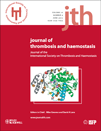
JOURNAL OF THROMBOSIS AND HAEMOSTASIS
Scope & Guideline
Unraveling the Complexities of Blood Disorders
Introduction
Aims and Scopes
- Thrombosis and Hemostasis Mechanisms:
Investigates the fundamental biological processes underlying thrombosis and hemostasis, including coagulation pathways, platelet function, and the role of the endothelium. - Bleeding Disorders:
Focuses on the diagnosis, treatment, and management of inherited and acquired bleeding disorders, such as hemophilia, von Willebrand disease, and others. - Anticoagulation and Thrombotic Risk Management:
Explores the efficacy and safety of anticoagulant therapies, risk assessment strategies, and guidelines for managing patients at risk of thromboembolic events. - Clinical Trials and Innovations:
Reports on novel therapeutic approaches, including gene therapies, monoclonal antibodies, and emerging anticoagulants, aimed at improving patient outcomes. - Translational Research:
Emphasizes studies that translate laboratory findings into clinical practice, providing insights that can directly impact patient care in thrombosis and hemostasis. - Guidelines and Best Practices:
Provides updates and consensus guidelines from leading experts and committees on the management of various thrombotic and bleeding disorders.
Trending and Emerging
- Gene Therapy for Hemophilia:
Emerging studies on gene therapy approaches for hemophilia treatment are on the rise, showcasing innovative strategies to address genetic deficiencies in coagulation factors. - COVID-19 Related Thrombosis Research:
Significant attention is being given to the thrombotic complications associated with COVID-19, including mechanisms, management, and long-term outcomes. - Personalized Medicine in Thrombosis Management:
Research focusing on individualized treatment strategies, including the use of genetic and phenotypic markers to guide anticoagulation therapy, is gaining traction. - Impact of Inflammation on Coagulation:
Studies exploring the relationship between inflammation and coagulation pathways are becoming increasingly relevant, particularly in chronic diseases and infection contexts. - Advanced Imaging and Biomarker Studies:
There is a growing interest in the use of advanced imaging techniques and biomarker identification to improve the diagnosis and management of thrombotic disorders.
Declining or Waning
- Traditional Diagnostic Assays:
There is a noticeable decrease in studies focused solely on traditional diagnostic assays for coagulation disorders, as newer, more advanced methodologies gain traction. - Basic Science Without Clinical Relevance:
Research that does not directly translate into clinical applications or patient outcomes appears to be receiving less attention, as the journal emphasizes studies with clear implications for patient care. - Pharmacological Interventions with Limited Evidence:
Topics that discuss pharmacological interventions lacking robust clinical trial data or clear efficacy are becoming less common, as the journal's readership seeks evidence-based findings. - Historical Perspectives:
Papers centered on historical analyses of thrombosis and hemostasis are decreasing, possibly as the focus shifts towards innovative and forward-looking research.
Similar Journals

JOURNAL OF THROMBOSIS AND THROMBOLYSIS
Exploring the complexities of blood coagulation.JOURNAL OF THROMBOSIS AND THROMBOLYSIS, published by Springer in the Netherlands, serves as a vital platform for research in the fields of Cardiology and Cardiovascular Medicine and Hematology. With an impressive impact factor, this journal ranks in the Q2 category for both fields according to the latest metrics, evidencing its significant influence and contribution to ongoing scholarly discourse. Spanning over three decades from 1994 to 2024, the journal provides an essential source for innovative studies, clinical practices, and comprehensive reviews related to thrombosis and thrombolysis. Researchers, clinicians, and students alike will find valuable insights and cutting-edge knowledge that address the complexities of blood coagulation and its implications in cardiovascular health. The journal is indexed in Scopus, with commendable rankings, further establishing its reputation in the academic community.
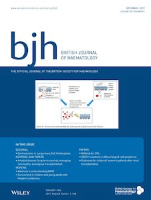
BRITISH JOURNAL OF HAEMATOLOGY
Pioneering Insights in Blood Disorders and TreatmentsBritish Journal of Haematology, published by Wiley, is a leading journal in the field of hematology, with an impressive impact factor reflecting its significance in the medical research community. Established in 1955, the journal has consistently contributed to advancing knowledge in hematology, currently holding a prestigious Q1 ranking in the Scopus category of Hematology, placing it in the top 18% of the field. The journal encompasses a broad range of topics including clinical and laboratory aspects of blood disorders and hematological malignancies, making it an essential resource for hematologists, researchers, and healthcare professionals. With its commitment to publishing top-tier research and clinical studies, the British Journal of Haematology plays a critical role in shaping treatment approaches and improving patient outcomes worldwide. Please note that this journal does not offer Open Access options, ensuring that published content is rigorously curated for quality and relevance.
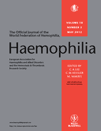
HAEMOPHILIA
Connecting scholars to transform clinical practices.HAEMOPHILIA is a leading peer-reviewed journal published by Wiley, dedicated to advancing research and clinical practices in the fields of hematology and genetics. With an impressive Impact Factor and recognition within the Q1 category for Genetics (clinical), Hematology, and Medicine (miscellaneous), this journal presents a unique platform for the dissemination of high-quality research from 1995 to the present. Researchers in these dynamic fields will find invaluable insights through original articles, systematic reviews, and clinical trials, all aimed at improving therapeutic strategies and patient outcomes. Although it operates on a subscription basis, HAEMOPHILIA's commitment to excellence is reflected in its Scopus rankings, where it stands in the 74th percentile for hematology and the 71st percentile for clinical genetics. As an essential resource for academics, healthcare professionals, and students, HAEMOPHILIA plays a pivotal role in fostering innovation and collaboration within the global medical community.
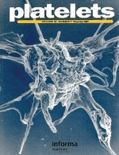
PLATELETS
Innovating hematology through groundbreaking research.PLATELETS is a distinguished journal published by Taylor & Francis Inc that has been at the forefront of research in the fields of hematology and medicine since its inception in 1990. With an ISSN of 0953-7104 and an E-ISSN of 1369-1635, this journal boasts a solid reputation, as reflected by its Q2 ranking in both Hematology and Miscellaneous Medicine categories in 2023. PLATELETS serves as an essential platform for disseminating pioneering research, reviews, and case studies related to platelet biology, thrombosis, hemostasis, and their clinical implications. Although not an open-access publication, it is indexed in reputable databases, ensuring visibility and citation of quality contributions. Researchers, clinicians, and students alike will find valuable insights that may inform their work and enhance their understanding of the crucial role of platelets in health and disease. This journal's commitment to advancing knowledge and fostering innovation makes it a pivotal resource in the academic community.

ANNALS OF HEMATOLOGY
Connecting researchers and clinicians for a healthier tomorrow.ANNALS OF HEMATOLOGY, published by Springer in Germany, stands as a premier platform for advancing knowledge in the field of hematology and medicine at large. With a significant impact factor and recognized rankings—Q2 in Hematology and Q1 in Medicine (miscellaneous) as of 2023—this journal is pivotal for researchers, clinicians, and students who are keen on exploring the latest developments in blood disorders, treatments, and innovative methodologies. Its broad scope encompasses original research, reviews, and discussions that aim to foster interdisciplinary dialogue, ensuring that the latest findings and theories are accessible to the scientific community. Although not an open-access journal, its rigorous peer-review process guarantees high-quality contributions, thereby solidifying its reputation as a vital resource in the hematological field. Founded in 1991, the ANNALS OF HEMATOLOGY continues to evolve, converging invaluable insights from both basic and clinical research until 2024. For those dedicated to improving patient outcomes and advancing hematological science, this journal remains an essential reference.

BLOOD REVIEWS
Connecting professionals through cutting-edge research.BLOOD REVIEWS is a highly regarded journal published by Churchill Livingstone, specializing in the fields of Hematology and Oncology. With an impressive Q1 ranking in both disciplines and placing in the top 10% of its peer categories according to Scopus metrics, it provides an essential platform for the dissemination of cutting-edge research and reviews pertaining to blood disorders and cancer treatment. Since its inception in 1987 and continuing through 2024, the journal has established itself as a cornerstone for healthcare professionals, researchers, and students who seek to advance their understanding of hematologic and oncologic topics. While not an open-access journal, BLOOD REVIEWS retains a reputation for delivering high-quality, peer-reviewed articles that foster dialogue and innovation within the scientific community. For those in the United States and beyond, the journal serves as a vital resource, housed at the Journal Production Department in Edinburgh, Scotland, ensuring accessibility and a global reach in its critical academic contributions.

Indian Journal of Hematology and Blood Transfusion
Elevating Knowledge: Your Source for Hematology ExcellenceIndian Journal of Hematology and Blood Transfusion, published by SPRINGER INDIA, serves as a leading platform for disseminating original research, reviews, and case studies in the field of hematology. With an ISSN of 0971-4502 and E-ISSN 0974-0449, this journal has been instrumental in advancing knowledge from 2000 to 2024, providing insights into critical issues surrounding blood disorders and transfusion practices. Currently ranked in the Q3 category for Hematology for 2023, it reflects a commitment to high-quality scientific content amidst a competitive landscape where it ranks 97/137 in Scopus for Medicine - Hematology, placing it in the 29th percentile of its peers. The journal primarily addresses a diverse readership, including researchers, healthcare professionals, and students, aiming to foster innovation and collaboration within the field. Although it operates under a subscription model, access options for individual articles and institutional subscriptions ensure that valuable research is disseminated widely to enhance medical practice and education in hematology.

CLINICAL HEMORHEOLOGY AND MICROCIRCULATION
Enhancing Understanding, Inspiring Clinical ApplicationsClinical Hemorheology and Microcirculation, published by IOS Press, is a distinguished journal dedicated to advancing the scientific understanding of blood flow mechanics and microcirculatory phenomena. Since its inception in 1991, the journal has been pivotal in bridging the fields of cardiology, hematology, and physiology, as evidenced by its placement in the Q3 quartile across several categories in 2023. Positioned in the vibrant academic landscape of the Netherlands, Clinical Hemorheology and Microcirculation offers valuable insights to researchers and practitioners alike, enriching their knowledge and fostering innovation in clinical practices. With an ISSN of 1386-0291 and an E-ISSN of 1875-8622, the journal serves as a vital platform for disseminating high-quality research and reviews that explore the intricate dynamics of blood viscosity and microvascular function, essential to both health and disease. As readers delve into the journal, they will access rigorous studies that not only enhance theoretical understanding but also pave the way for potential clinical applications, making it a crucial resource for those invested in the future of cardiovascular and hematological research.
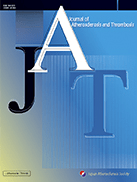
Journal of Atherosclerosis and Thrombosis
Advancing cardiovascular knowledge for a healthier future.Journal of Atherosclerosis and Thrombosis is a leading academic publication dedicated to advancing research in the fields of cardiovascular medicine, biochemistry, and internal medicine. Published by the Japan Atherosclerosis Society, this esteemed journal operates from its headquarters in Tokyo, Japan, and has been a vital resource in its area since its inception in 1994. With its robust impact in Cardiology and Cardiovascular Medicine, ranking in the top quartile (Q1) as of 2023, and a commendable standing in Internal Medicine and Biochemistry, the journal fosters an environment of innovation and discovery, showcasing significant studies and advancements that shape clinical practices and therapeutic approaches. Though not an open-access publication, it offers a wealth of insights to researchers, professionals, and students seeking to deepen their understanding of atherosclerosis and thrombosis. By continually featuring high-quality articles, the Journal of Atherosclerosis and Thrombosis plays an essential role in bridging the gap between research and practice, facilitating critical conversations that influence the future of cardiovascular health.
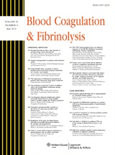
BLOOD COAGULATION & FIBRINOLYSIS
Exploring Innovations in Blood HealthBLOOD COAGULATION & FIBRINOLYSIS, a distinguished journal in the field of hematology, is published by Lippincott Williams & Wilkins, a reputable name in academic publishing. Since its inception in 1990, this journal has been committed to advancing the understanding of blood coagulation and fibrinolysis, focusing on the molecular mechanisms, clinical implications, and therapeutic aspects of these critical processes. With an impact factor reflecting its significance within the academic community, currently ranking Q3 in both Hematology and Miscellaneous Medicine for 2023, this journal serves as a pivotal platform for researchers and professionals alike. By providing access to cutting-edge research and reviews, BLOOD COAGULATION & FIBRINOLYSIS endeavors to foster collaboration and innovation in the treatment of coagulation disorders. Interested readers can explore ongoing contributions to the field through subscriptions and institutional access options.